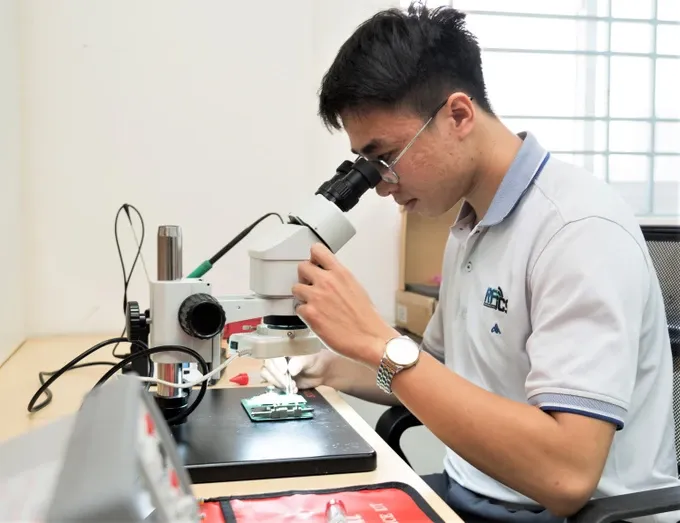
Until now, various universities in all regions of Vietnam have marketing their new attractive training program – microchip discipline.
In the North, Hanoi University of Science and Technology now offers nine IC-related majors and is training more than 3,300 students in this field. Vietnam National University-Hanoi trains 1,500 students in IC design and semiconductor industry each year on average and is expected to double this quantity in the near future, with a clear focus on invention facilitating. Short courses related to microchip discipline are run as well to timely train sufficient laborers for this human resources thirst.
In the South, the three members of Vietnam National University-HCM, namely HCMC University of Technology, University of Information Technology, and University of Science, have received approval to open training programs in the microchip discipline.
VNU-HCM is now teaching about 6,000 students in majors directly or indirectly related to microchip and semiconductor. During the 2023-2030 period, it will focus more on in-depth training in this field to satisfy the need for high-quality human resources. By 2027, VNU-HCM will have enrolled 1,000 laborers in both the microchip and semiconductor industries.
In the Central region, the three members of Da Nang University, namely University of Science and Technology, University of Technology and Education, and Vietnam-Korea University of Information and Communication Technology, have formally launched their training programs for IC design.
Alongside that are many more state-owned or private universities nationwide training human resources for this field.
Deputy Director Vo Xuan Hoai of the National Innovation Center (under the Ministry of Planning and Investment) shared that the Government has assigned the Ministry of Information and Communications to develop a practical strategy for human resources training in IC design. Among more than 300 universities and colleges in Vietnam, only a small number are able to carry out this mission, but still in serious need of laboratories and more partnerships with businesses in the field.
Therefore, Deputy Director Hoai suggested a longer-term strategy plus suitable policies to boost the growth of microchip human resources in the country because the current quantity can only answer 20 percent of the demand. Most of them are working in HCMC (85 percent), Hanoi (8 percent), and Da Nang City (7 percent).
By 2030, Vietnam will have sought 55,000 high-quality laborers for the microchip industry. It is advisable to first focus on qualified training in universities already having advantages in technology like Vietnam National University-Hanoi, Vietnam National University-HCM, Hanoi University of Science and Technology.
President Mai Thanh Phong of HCMC University of Technology (VNU-HCM) stated that among the four stages of a global microchip supply chain (IC design, IC manufacturing, IC quality control, and IC packaging), Vietnam can only be in charge of the first one.
The good news is this stage can create high added value for microchips. As several leading IC design corporations are rushing to Vietnam to employ high-quality talents for this aspect, Vietnam should take good advantage of this opportunity, beginning with paying more attention to quality in training human resources for IC design.
According to Deputy Director Tran Manh Ha of the Software Technology Park (under VNU-HCM), the university is developing advanced training programs for the microchip discipline with the aim to introduce 1,000 engineers by 2027. VNU-HCM is asking for support from both the Government and the local authorities while trying to form strong partnerships with international organizations to invite renowned professors in the world as guest lecturers.
President of VNU-HCM Vu Hai Quan further added that his university has just signed a strategic cooperation agreement with Synopsys Corp. (the US), Deakin University (Australia), and other domestic and foreign corporations to increase the training and research capability of VNU-HCM in IC design. Facing many challenges in this training process, VNU-HCM is using all possible resources and support from its partners so that it can successfully train international-standard human resources for IC design.
























